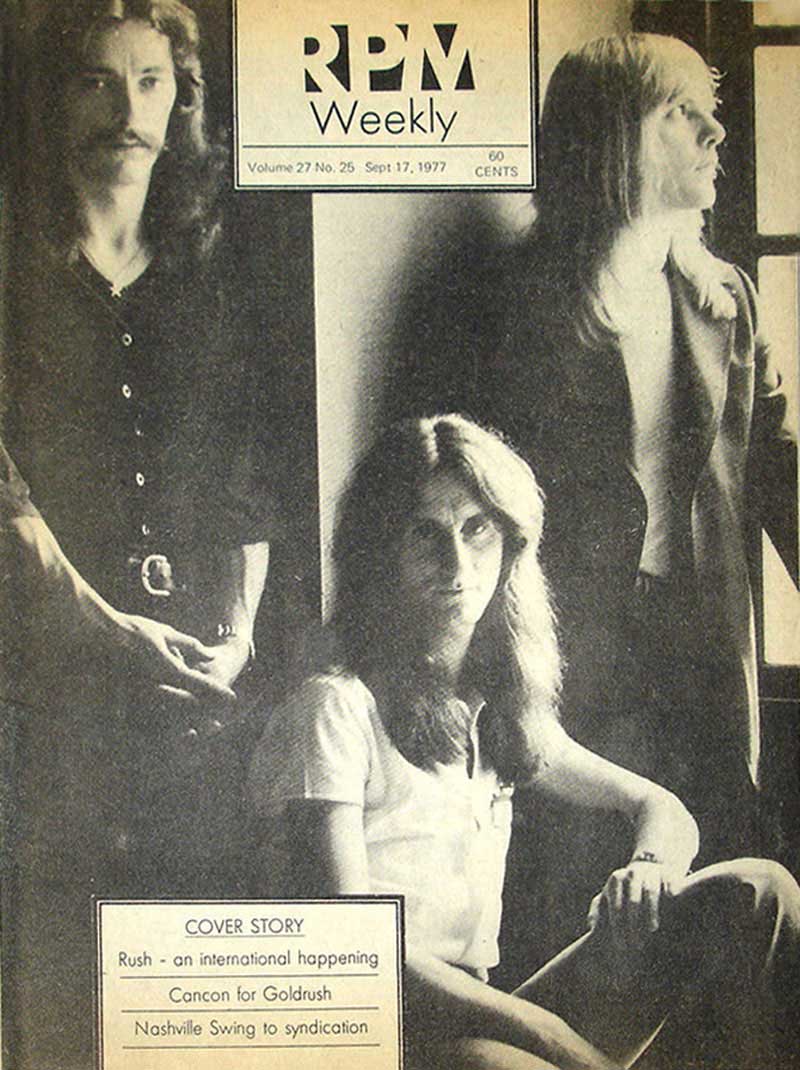Rush - An International Happening
RPM Weekly, September 17, 1977, transcribed by John Patuto

The Toronto Star's Peter Goddard recently wrote: "Rush may be Toronto's most pronounced success story". By every indication, Rush can now qualify as a Canadian supergroup and very close to becoming similarly accredited internationally.
The making of Rush and ultimately the album A Farewell To Kings, began back in the late sixties. Even at that time Rush had established their sound as progressive rock and began fighting for an audience and one that wasn't going to come from airplay. Rush began as a people's group not a programming entity.
Rush's first album, titled under their name, was produced early in 1974 and released on Moon Records. The session was financed by Ray Danniels and Vic Wilson. Other than boasting an album release, there was really not much accomplished by the release. The album did serve to bolster the morale of the group and to open, very slightly, the door to the south. ATI, a U.S. booking agency indicated an interest in the group resulting in Mercury Records moving in with a long term recording contract and an international release for their initial Moon album. There was an obvious concentration on the U.S. market and an American tour was firmed and then Rush's first disaster struck. Drummer John Rutsey left the group because of ailing health. Fortunately, Neil Peart was seemingly waiting in the wings and joined the group with a scant two weeks before tour time. The chemistry was right however and Geddy Lee, Alex Lifeson and Neil Peart were musically welded together for their initial thrust into the heavy metal marketplace.
So successful was their unique approach to the music business, it was found necessary to set up another album session, less than one year after their debut on Mercury. Their Toronto Sound production resulted in Fly By Night which went on to earn a gold award in Canada and what was regarded as "respectable sales" in the U.S. The album was also credited with bringing the group into Canadian recognition and their Juno win as Most Promising Group.
Early in the game Rush realized there was more to the recording business than churning out albums or singles and relying on radio play. The name of the game was "acquiring and holding an audience". Neil Peart explains: "There are only two ways open to survival for a band in the music business - one is by a quick capitalization on a manufactured or accidental hit single and the other is a slow steady climb accomplished by long hard touring. So, we toured."
July of 1975 saw another album session at Toronto Sound and the release of Caress Of Steel. Says Peart: "We went in serene and confident and emerged with an album that we were tremendously proud of, as a major step in our development and featuring a lot of dynamic variety and some true originality." The lack of recognition (and sales) of this album was another disappointing phase in the life of Rush. Into the studios once again and says Peart: "We came back with a vengeance with 2112, perhaps our most passionate and powerful album yet. We were talking about freedom from tyranny and we meant it. This was the first real blend of our diverse and schizophrenic influences and it was also our first really successful album". The success of 2112 led to the recording of Rush's first live album, All The World's A Stage which was recorded in Toronto's Massey Hall from three performances of June 1l, 12 and 13, 1976.
Rush now consider themselves entering chapter two of their musical life, and perhaps their most critical in a never-ending fight for survival in a business that almost demands a shattering finale.
Perhaps Neil Peart better explains the beginning of Rush's phase two with his fact and fantasy treatise on their most recent album release, A Farewell to Kings, a superb production that should serve to create an even greater international market for this Anthem group.
Classics, Rush & Max Top Polydor CNE List
The crush of bodies at Polydor's CRIA Pavilion exhibit has kept the staff moving at a hectic pace. The label's Dieter Radecki reports the top request items are Rush and Max Webster but that the classics would appear to be top sales items across the aisle at the record store.
There have been some complaints that the prices charged at the Pavilion record store are a little too high to attract buyers and many of these potential buyers are discovering a Midway hustler who is selling rock products for $2.00 less than those featured at the CRIA record store.